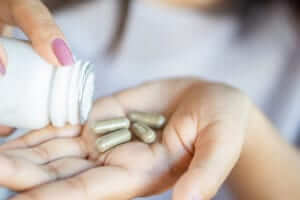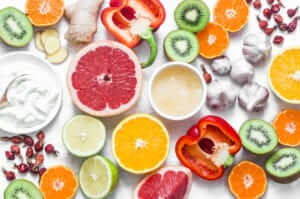With the time we spend focusing on safe sex and preventing unplanned pregnancy, you might be under the impression that falling pregnant is quick and simple–one night of “trying” and the goal of becoming pregnant it achieved! But for many, it’s not that simple.
There are several vital signs in functional medicine that provide insight into your body’s fertility if you know what to look for. Some people seem to be extra fertile, but what makes one person more fertile than another?
While it’s true that a percentage of fertility is due to factors like polycystic ovarian syndrome, PCOS, or other genetic factors, diet and environmental factors play a significant role in fertility–for both men and women. Such as poor sleep or high stress.
We’ll talk about which physical, mental, and hormonal signs you should look for to make sure your vitality and virility are in great shape. And we’ll go over some common fertility troubleshooting questions like hormone imbalances, lifestyle factors that influence fertility, and foods and supplements you can take to boost performance both in and outside the bedroom.
Top 4 Signs of Fertility
While the indicators of fertility in both men and women overlap with the components of health overall, there are a few subtle (and sometimes not so subtle) ways your body communicates fertility. You’re more likely to have better fertility if:
1. Your Cycle Is Regular
A healthy menstrual cycle is the first chapter of the book of pregnancy. A properly functioning cycle supports a healthy pregnancy and–dare we say–a healthy baby as well.
PMS symptoms, flow, regularity, and ovulation are all significant indicators of a well-functioning menstrual cycle–and your cycle determines MUCH of your fertility.
If you have irregular periods, you may have a hormone imbalance or struggle with PCOS, both of which can affect your ability to get pregnant if left untreated. For natural PCOS solutions, read more here.
PMDD or severe PMS symptoms, such as mood swings, debilitating cramps, and sore breasts can be symptoms of estrogen dominance, which shortens the window an egg (at this stage, called a blastocyst) can implant into the uterus (1).
Herbs and supplements for a healthy cycle include:
DIM which helps support the metabolism of excess estrogen (2)
Vitex to promote healthy progesterone levels after ovulation (3)
B6 increases progesterone while modulating estrogen, and can become depleted if experiencing estrogen  dominance (4).
dominance (4).
(B vitamins work synergistically, and are most effective when fully methylated and part of a complex.)
One misleading fact is that a woman can still have a period, with PMS symptoms and a heavy flow, without ever ovulating. So getting a period isn’t always a reliable way to determine if you’re ovulating and able to get pregnant.
Work with an integrative practitioner to discuss all the signs of ovulation, and how you can maintain a healthy cycle. Schedule a virtual visit here.
2. You Have Balanced Hormones
Hormone imbalances can wreak havoc on the body and its communication system. Because hormones control everything from blood sugar balance, to appetite, to fertility, when one becomes imbalanced, it can affect the others and cause a cascade of side effects.
Getting your hormones tested up to a year prior to becoming pregnant is a great idea to not only prepare your body for pregnancy but also to support overall health as well. Many things we think are “normal” such as uncomfortable PMS symptoms, or an energy crash in the afternoons can actually be signs of hormone dysfunction.
Two common fertility troubles linked to hormone imbalances are thyroid irregularities, or PCOS that can delay ovulation–or stop it altogether (5).
Your CentreSpringMD provider can provide hormone testing, and a plan of action to restore balance if necessary.
Virtual visits are available now, check out how we work and begin to balance your hormones today.
3. You Have Healthy Hair & Skin
Our hair and skin can tell us a lot about what’s going on inside our bodies. Healthy skin is often a reflection of liver health, while a full head of hair can reflect hormone balance or be an indicator for conditions like PCOS, or the body’s inability to properly handle excess stress.
If you experience hormonal acne or excessively oily skin, this can also be a sign of PCOS, or possibly unidentified food sensitivities causing inflammation in the skin.
Breakouts can also indicate poor detox in the liver, which aids in insulin function and fatty acid metabolism. A healthy liver is a must for fertility. More on the importance of detoxification later on.
4. You Eat A Nutrient-Dense Diet
Much of what determines fertility is heavily impacted by diet. There are dozens of different nutrients the body needs to not only carry a baby, but to sustain a healthy menstrual cycle, sex drive, and sperm production!
We’ll talk about what to avoid in an optimal fertility diet in just a minute, but to promote fertility, a nutrient-dense diet contains:
Plenty of vegetables.
Especially leafy greens, for fiber, vitamins, AND folate (not folic acid). Plus, greens help support liver detox, and we’ll talk about why that’s so important for fertility later.
Healthy Fats.
Some of the most ideal foods for women wanting to conceive are high-quality fats.
They are the building blocks for cholesterol (the good kind) and hormones, and without them, your body will struggle to maintain the hormonal balance you need for a comfortable menstrual cycle, ovulation, and pregnancy.
B vitamins and choline.
Crucial to brain development and preventing neural tube defects, choline can be thought of as a sister to B vitamins. Most women don’t consume enough choline, and for the approximately 40% of people who have MTHFR, and are unable to use folic acid, you’d need to consume folate from food or a methylated B complex. Methylation is also an especially important issue for those managing PCOS.
Egg yolks, liver, nuts, kale, and grass-fed meats are great sources of B vitamins and choline. Boost is also fully methylated for those who struggle to get the recommended B vitamins from their diet.
Fish and Omega 3s
Omega 3s have gotten much attention in the past several years, and rightly so. EPA and DHA, the primary types of omega 3 fats are essential for brain and eye development, and the health of many other systems. Fatty fish, like salmon, are great sources of omega 3s, and are low in mercury, so it’s a safer option during pregnancy (6).
Fish are great sources of protein, iodine, zinc, and vitamin D, all of which are crucial for hormone production, healthy levels of inflammation in the body, and immune function.
If seafood isn’t your thing, consider adding a high-quality omega 3 supplement to your routine. We like this form of EPA and DHA.
Integrative Medicine Approach to Men’s Fertility
While women have an intricate balance of many systems working to support fertility, and much of the conversation revolves around them, let’s not forget that “it takes two” in this situation.
Sperm have a difficult job of not only finding an egg but then being robust enough to penetrate and fertilize the egg.
Keeping sperm healthy is just as important as healthy eggs inside the  ovary. So what can men do to make sure sperm are strong swimmers and a good candidate for fertilization?
ovary. So what can men do to make sure sperm are strong swimmers and a good candidate for fertilization?
Eat a diet rich in antioxidants to ensure healthy sperm. Anywhere from 30-18% of male infertility is due to oxidative stress on a cellular level (7). To support motility and quality in sperm, get plenty of antioxidants in the diet from deeply-colored veggies, and quality proteins.
Zinc also improves sperm quality, count, and motility. Pumpkin seeds are one of the highest sources of dietary zinc (8).
Supplements for male fertility (9,10):
Antioxidant Superfood Smoothie for Dad
Ingredients:
- A handful of greens (kale, chard, spinach, deep-colored leafy greens)
- 1 tablespoon raw pumpkin seeds
- 1 tablespoon walnuts
- ⅓ cup blueberries (fresh or frozen)
- ¼ cup yogurt of choice (greek, or plant-based if preferred)
- A handful of ice cubes
- Splash of coconut, hemp, or almond milk
*Protip: freeze almond, coconut, or hemp milk cubes in advance for a creamier smoothie!
Holistic Wellness and Infertility Risks
Those who have navigated fertility issues can tell you: don’t wait until you’re trying to become pregnant to start taking care of the diet and lifestyle behaviors that support this goal. Our modern lives are in direct conflict with many of the important systems our body needs to create and sustain life.
Wellness is inseparable from fertility health, and an integrative approach combines comprehensive physical, mental, and hormonal solutions to heal the systems responsible for not only creating life, but sustaining it as well.
Diet
If your diet is high in sugar or processed foods, there’s a good chance your toxic load is high, and your blood sugar balance is less than ideal. A good diet will provide the vitamins, minerals, and phytonutrients a healthy body needs to become pregnant and carry a healthy baby.
If you’ve been working to change your diet and aren’t seeing the success you want, work with a health coach to get behavior changes handled. Sometimes it’s about more than having the right information–you have to put a plan into action.
Obesity
Even though it’s important to appreciate the body you’re in, from a fertility perspective, excess body fat can complicate becoming pregnant, and other important functions like hormone balance and insulin levels.
For those struggling with PCOS, blood sugar imbalance and insulin production are at the root of managing symptoms, and this can make losing weight–even with an active lifestyle–especially difficult.
Excess insulin, due to PCOS or a poor diet, affects androgen production, which can interfere with ovulation.
Excess body fat can also interfere with estrogen and progesterone balance as well, causing symptoms of estrogen dominance, and decreased ovarian function (11).
Stress
Possibly the most common enemy fertility is the one that’s the most overlooked
Life is stressful. Thinking about fertility problems is stressful. But one of the biggest positive impacts you can have on your own hormone function and fertility health is to decrease daily stress and employ some basic stress management techniques.
When stress levels increase, your body produces stress hormones–cortisol, epinephrine, norepinephrine–and your fertility hormones take  a back seat. This is your body prioritizing survival over creating a baby.
a back seat. This is your body prioritizing survival over creating a baby.
Stress isn’t isolated to the brain, as many may think. What we do to the brain, we do to the body, and vice versa, so the effects of stress–especially ongoing and chronic–are a major factor for proper progesterone production and overall hormone balance.
You may notice your period comes a little earlier, and your PMS symptoms are worse if you’re under increased stress.
Identify stressors in your life and take steps to address patterns of thoughts that aren’t serving you.
Meditation, journaling, and taking time for self-care all help bring stress levels down and therefore levels of stress hormones in the blood, leaving your fertility hormones a place to do their job.
Overexercising
In the quest for a svelte physique, there are some who take this idea a little too far, exceeding the limits our body prefers to be able to carry a baby. While being fit and a healthy weight is a great foundation for pregnancy, this concept does have a limit.
Overexercise (high-intensity for more than 60 minutes) can actually create inflammation within the body, and create dysfunction in the HPA axis (12). This increases production of stress hormones and the body will put fertility function on hold.
Physiologically, if the demands on our body exceed physical capability, this can be detrimental to fertility. But every body is different. Listening to the feedback your body gives you during exercise is important for each individual woman. There isn’t a single one-size-fits-all exercise guideline.
If your cycle is shorter than normal, excessively painful, or unpredictable, AND you’re exercising at a high intensity, 6-7 days per week, you may re-evaluate your fitness regime and see if a lighter schedule could benefit your hormone production and stress level.
Toxic load
Endocrine disruptors in our modern environment have become almost ubiquitous–meaning, they’re everywhere. In our food, water, air, and even body care products.
What does this have to do with fertility?
All hormones are part of the endocrine system–estrogen, testosterone, progesterone, insulin. And unfortunately, many compounds we come into contact with every day disrupt the signals of this complex system.
Parabens and phthalates in household and body care products, and organophosphates in pesticides build up in the body and interfere with normal hormone function. And these are just a few of the hormone-disrupting offenders we come into contact with.
Toxins can also do damage at a cellular level–increasing oxidative stress and harming a developing egg cell, which takes up to 90 days to mature before ovulation (13).
To protect developing eggs and increase antioxidant activity, supplement with:
- NAC to support the body’s production of glutathione, which is a powerful antioxidant
- Glutathione
To support detox pathways in the liver, which is the body’s biggest detoxification organ, a simple detox is a great way to increase the capacity of those pathways.
If you suspect a heavy metal toxicity, it’s important you work with a provider to support each stage of the detox process in a way that’s safe for you AND your fertility goals.
Why an Integrative Approach Is Best
Preconception care starts well before you think about picking out a prenatal. An integrative practitioner will examine your body as a whole, which can have a big impact on carrying a healthy pregnancy.
A holistic and integrative practitioner at CenterSpringMD can help you
- Identify and reduce toxic load
- Address hormone imbalance
- Treat PCOS and provide therapies for endometriosis
- Identify nutrient deficiencies and supplements to correct them
The best fertility support comes from a compassionate team who will see your body as a whole, and not merely a sum of symptoms or body parts.
Infertility is a complex and emotional journey with many factors that your CentreSpringMD will help you navigate. Begin your fertility journey today.
Resources
- https://www.ncbi.nlm.nih.gov/pubmed/12601161
- https://www.ncbi.nlm.nih.gov/pmc/articles/PMC3048776/
- https://www.sciencedirect.com/science/article/pii/S1726490116301484
- https://www.ncbi.nlm.nih.gov/pubmed/6889807
- https://www.ncbi.nlm.nih.gov/pmc/articles/PMC3657979/
- https://radicatanutrition.com/guest-post-6-prenatal-nutrition-misconceptions-that-need-to-stop-by-lily-nichols-rdn-cde-clt/
- https://www.ncbi.nlm.nih.gov/pubmed/21249690
- https://www.ncbi.nlm.nih.gov/pmc/articles/PMC6010824/
- https://www.ncbi.nlm.nih.gov/pmc/articles/PMC4163266/
- https://www.ncbi.nlm.nih.gov/pmc/articles/PMC3800531/
- https://rbej.biomedcentral.com/track/pdf/10.1186/s12958-018-0336-z
- https://www.ncbi.nlm.nih.gov/pubmed/28035585
- https://www.ncbi.nlm.nih.gov/pmc/articles/PMC1215514/

